AWARD-WINNING HOMEWORK HELP
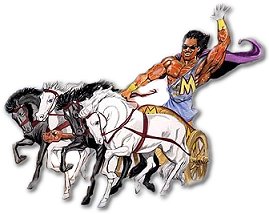
PROMETHEUS, GIVER OF FIRE
MYTHOLOGY'S ORIGINAL REBEL
HOMEWORK PAGE TWO
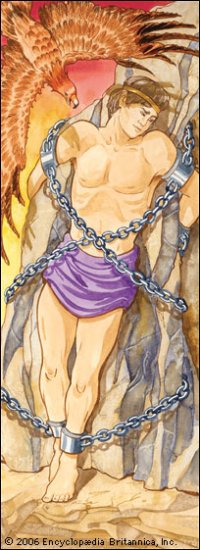
(C) Encyclopedia Britannica
 CLICK TO ENLARGE |
| Unrepentant for his actions, and fully aware
that he had done the right thing in stealing fire from Olympus
and giving it to Man, Prometheus was resigned to eternal life on
the rocks, so to speak. |
 By Kerry Burch CLICK TO ENLARGE |
| Zeus did make Prometheus wear a ring, in which a piece of the Caucasus rock was set, as a symbol of his painful connection with the mountain. |
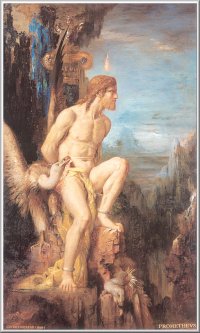 By Gustave Moreau CLICK TO ENLARGE |
| "Forget it, Big Guy!" replied our hero, a rebel to the end... |
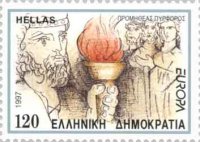 CLICK TO ENLARGE |
As if that wasn't bad enough, each day an
enormous eagle (some say a vulture), sent by Zeus, would arrive and eat at
Prometheus' liver, feasting on the helpless Titan. To make matters worse, the
liver would grow back overnight and the whole ordeal would be repeated the
following day. Talk about cruel and unusual punishment!
For thirty years (some say one thousand, or
even thirty thousand years) Prometheus endured this excruciating pain and
torment. Being a god he couldn't die, hence his ordeal could not be eased. At
one point Zeus offered him a chance to free himself by revealing information
that Prometheus knew. Since our hero had the power of Foresight, he knew the
name of the one who would overthrow Zeus, just like Zeus had done to Cronus. The
King of the Olympians promised Prometheus that he would set him free if only the
Titan revealed the identity of his potential usurper.
Nothing doing. Stubborn Prometheus informed the Messenger god Hermes, who had
delivered Zeus' offer, to tell his boss to go fly a kite. He couldn't be bribed.
"Go and persuade the sea wave not to break.
You will persuade me no more easily."
Talk about a rebel! Prometheus was the kind of guy you'd want on your side in a brawl! He was tough and his morals were uncompromising. Even though his body was bound, his spirit was free and the Titan refused to buckle to Zeus' threats, torture and tyranny. Here's what he told Hermes:
"There is no force which can
compel my speech.
So let Zeus hurl his blazing bolts,
And with the white wings of the snow,
With thunder and with earthquake,
Confound the reeling world.
None of this will bend my will."
Hesiod, "Theogony"
Zeus felt bad. He wasn't a mean-spirited god, after all,
and deep down he admired Prometheus for sticking to his ideals. So he
offered a slim glimmer of hope to our hero: Zeus told the Titan that he
could go free if two conditions were met:
1) An Immortal would have to give up his life for Prometheus
2) A mortal would have to slay the liver-eating eagle
Small consolation, thought Prometheus...What Immortal would ever
give up his life for a Titan, he mused, and besides, there was no mortal
brave and strong enough to kill the evil beast that feasted on his
liver.
Unrepentant for his actions, and fully aware that he had done the right
thing in stealing fire from Olympus and giving it to Man, Prometheus was
resigned to eternal life on the rocks, so to speak.
But wait! Our story has a happy ending. You see, the Centaur (half man,
half horse) named Chiron, a wise and Immortal mentor of many Greek
heroes, had been accidentally shot and wounded by one of Heracles'
(Hercules) poisoned arrows. The arrows were deadly, having being dipped
in the blood of the dying Hydra. But being an Immortal, the gentle
Centaur could not die, but lived in horrid pain from the lethal poison.
Hearing of the plight of courageous Prometheus, Chiron volunteered to
die in his stead so that his unbearable pain would cease, at the same
time conferring his immortality upon the chained Titan. It was a
mutually beneficial move and fulfilled the first part of Zeus' terms.
Now, where could be found a mortal hero brave enough to challenge the
ferocious eagle?
Have no fear, Heracles is here! Passing by Mount Caucasus one day the
world's greatest hero, mighty Heracles, saw Prometheus bound to the
rock, with the frightful eagle merrily munching on his liver. This would
not do! Heracles was famous for always taking the side of the just, the
powerless and the overwhelmed.
Armed with his bow and arrows, gifts from the gods, mighty Heracles took
aim and let fly a missile at the beast. Bingo! One shot was all it took
and the Titan's tormentor became buzzard feed itself, killed instantly
by the poisoned arrow.
Prometheus was now free to go! By this time Zeus had realized his folly
in imposing such a stern sentence upon the brave Titan, so he invited
Prometheus to come and live on Mount Olympus. All was forgiven and our
hero rejoined his rightful place at the home of the gods.
Zeus did make Prometheus wear a ring, in which a piece of the Caucasus
rock was set, as a symbol of his painful connection with the mountain.
This represented the first ring to have a setting, and ever since humans
have worn rings in honor of the Titan, in gratitude for all the agony he
had endured on their behalf.
"No hard feelings. By the way, Prometheus, any chance of you telling me
the name of the one who will overthrow me?" asked Zeus.
"Forget it, Big Guy!" replied our hero, a rebel to the end...
But just to show that he harbored no grudge, Prometheus eventually did
tell Zeus and Poseidon, who were both pursuing a sea nymph named Thetis,
to avoid the girl at all costs. Prometheus informed the Olympian gods
that the son of Thetis would grow up to become mightier than his father.
A thankful Zeus promptly ordered Thetis to marry a mortal named Peleus
and their offspring was the great hero of the Trojan War, Achilles, who
indeed achieved a fame far surpassing that of his father.
Before his divine punishment Prometheus married Hesione, and is said to
have conceived Oceanus with her. He is also considered to have been the
father of Deucalion and in some cases is described as the brother of the
Titans Atlas and Menoetius, as well as the foolish Epimetheus.
The name of brave Prometheus has endured throughout the ages as the
world's first rebel and the champion of humanity. He fought against
divine authority for his ideals and ultimately paid a heavy price for
his Foresight.
Aren't you glad he did, though?
"O you bright sky of heaven,
you swift-winged breezes,
you river-waters,
and infinite laughter of the waves of ocean,
O universal mother Earth ,
and you, all-seeing orb of the sun,
to you I call!
See what I, a god, endure from the gods."
from Prometheus Bound by Aeschylus
BACK TO
PROMETHEUS PAGE ONE
LOTS MORE INFO AND PIX!
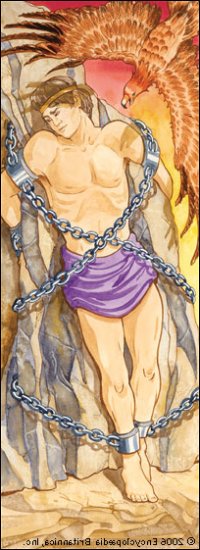
(C) Encyclopedia Britannica
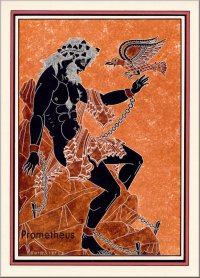 CLICK TO ENLARGE |
| Chiron volunteered to die in his stead so that his unbearable pain would cease, at the same time conferring his immortality upon the chained Titan. |
 CLICK TO ENLARGE |
| Armed with his bow and arrows, gifts from the gods, mighty Heracles took aim and let fly a missile at the beast. Bingo! One shot was all it took. |
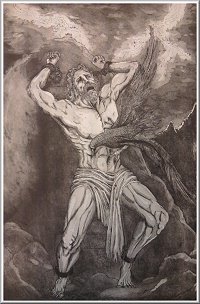 CLICK TO ENLARGE |
| The name of brave Prometheus has endured throughout the ages as the world's first rebel and the champion of humanity. |
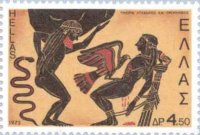 CLICK TO ENLARGE |
HOMEWORK HELP